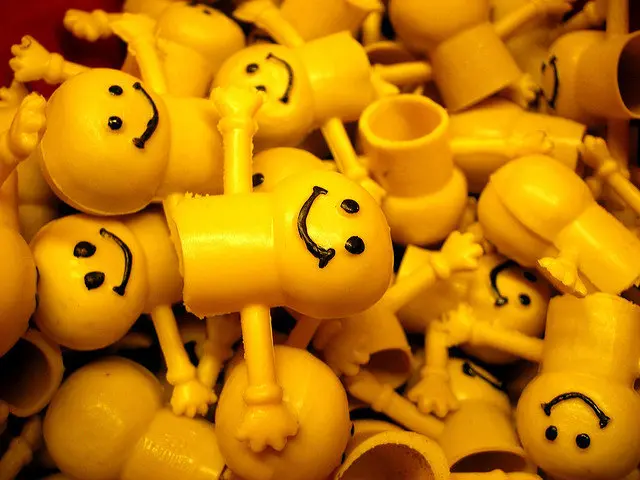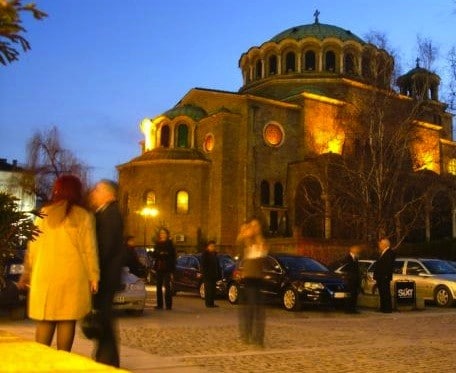Bulgaria is a country that’s culturally startling, from backward nodding to cuisine that seems to encompass the entire culinary map from Lebanon to Germany. Almost a constant barrage of “you think you know this but you don’t” even when it comes to something as innate to human beings as smiling. That is, something Bulgarians don’t do a lot of, at least not initially or without good reason.

It’s not to say Bulgarians aren’t a friendly bunch – most people around the world are – but getting the edge of their mouths to curve upward, even just a little, is a small challenge.
 You’ll See A Smile When You Deserve It
You’ll See A Smile When You Deserve It
Modern Bulgarians are the descendants of many Eurasian peoples, but most can trace part of their roots back to Central Asia. That’s a part of the world known for producing particularly tough smilers – the Chinese, Kazakhs, and Turks – a traditionally straight-faced bunch. Perhaps that’s an adaptation that comes from thousands of lean nomadic years with the likes of Alexander the Great, Genghis Khan, and other empire overlords repeatedly washing over the landscape. Not knowing friend or foe immediately, making smiles reserved for those moments only deserved and people familiar.
Smiles aren’t used to diffuse tensions as they are in the United States or parts of southeast Asia. And there’s nothing remotely awkward about someone starring blankly in your face as you tell them the funniest thing you’ve ever heard – at least in Bulgaria. You just roll over those dead moments without the hint of a grin; making for very emotionally efficient exchanges.
 All Or Nothing
All Or Nothing
That removal of the gap-filling-half-grin found in many other parts of the world leaves you in between straight stares and massive smiles. There isn’t a middle ground and most Bulgarians will tell you they don’t smile unless they have a good reason to. I tend to go against the grain in smile-heavy places (like Egypt, for example) but there are some situations where a smile is the perfect way to say things like, “thanks for the rakia” or “hi, I’m not a mugger”.
One night in Sofia, I was beyond lost and desperately needing directions (something that happens to me often). I went up to someone who looked trustworthy, and older lady. When she caught me walking in her direction she did everything to avoid me, and in the process of trying to catch up I nearly scared the wits out of her. A stupid smile on face and map in hand, she began giving me directions in broken English. We proceeded to have a conversation about Bulgaria’s communist days and her family history. All of this without a single smile until she invited me over to eat – and gave me the warmest (mostly) toothless smile I’ve ever received.
Although I didn’t take her up on the offer – I was still trying to find where I was going – it was a smile I truly felt I had earned. Invaluable insight into the psyche of a nation that has had its share of historical disappointments.
History In A Grin
Optimism isn’t the easiest outlook to acquire when you’ve gone from ruling two powerful empires to becoming a part of others, liberating yourself and then finding the Nazis rolling through. Some 70 years after World War II, the Balkan Wars before that, and now 22 years after the fall of communism, Bulgarians have seen major power shifts in and out of their favor over the centuries.
You can see the pragmatism that comes as a result on their faces; or when they flatly say “that’s not funny” to a corny joke. (Which I found incredibly humorous ironically enough.) The beauty of Bulgarian smiles – and those around the world – are how deep and fluid they show us culture can be. Although the act of smiling is inborn in humans, its meaning is not.
[top photo by: zoomar (smiley faces)]












I completely agree. I think as Americans we expect smiling to equate with friendliness, as it is in our culture to smile to ‘save face’. I always find it interesting to see in other cultures how friendliness and openness can come from someone you define as ‘gruff’, or someone can be very harsh while keeping a smile on their face. I find the more I travel to destinations where the culture is less dependent on warm facial expressions, the less I depend on them for communication myself!
It’s all very subjective isn’t it; gives friendly a different meaning from culture to culture – and I’m with you on that – finding each specific cultural code is one of the fun parts of travel 🙂
Funny how something like smiling we think we’ve got down comfortably can really throw us off in new places!
Hi Anil,
I used to get really annoyed at north american ear-to-ear toothpaste smiles. I’m used to the pseudo-fakeness now, but I still think that “smile” is a commodity in the west. I don’t know how similar Bulgaria is to Russia but people in parts of Russia I travelled to were very straight faced and cold… more than I ever pictured from reading countless stories. However, the moment you blurt few words in Russian, they broke out into warm smiles and genuine hospitality. I don’t know if its years of communism or fear of foreigners, or perhaps linked to the geo-political instability that the people suffered, but yeah, smile is the primary tool that our body uses for communication and even body-language readers learn to read smiles in their first chapters.
Hi Priyank, I’m guessing they’re both very similar in terms of smile-culture at least (I’ll confirm this September) but it is very direct. No sympathy smiles whatsoever but makes you try a bit harder for them 😉
I used to have a bad opinion of Bulgaria after a small incident in 2003, but I have gone bac since then and loved the place. Oddly, I did see plnety of smiles, could it be because it was summer?
haha, maybe you’re a better joke teller than I am! Not sure actually, any chance you were on the coast? Beaches tend to make people happier 🙂
I guess next step would be to start looking for Ukrainian elusive smile. Somehow I can’t stop being amazed by how many things we, Eastern Europeans, have in common!
And yes, I agree with the other commenters – It took me quite some time to get used to in-your-face smile, when I went to the US!
I’ll hopefully be in Ukraine looking for those smiles in September 🙂 and look forward to seeing the similarities and differences in the cultures.
Have any one place I shouldn’t miss while I’m there?
Oksana and Anil,
I agree with you completely! Eastern Europeans would tell me that smiling can make you look like a moron. So if that’s the case, they resist it. Also, they feel they are being more sincere. They’re really not happy about being at their job, so why should they smile?
I wrote more about it here:
http://francistapon.com/Travels/Western-Europe/Defending-the-American-Smile
Great article, Anil.
Yes, in this region too much smiling can come across as being ditsy (to say the least). Really enjoyed your post though, smiling is very culturally specific. I’d say people in the Philippines are even more “smiley” than Americans. It’s all a spectrum of course, no right or wrong 🙂